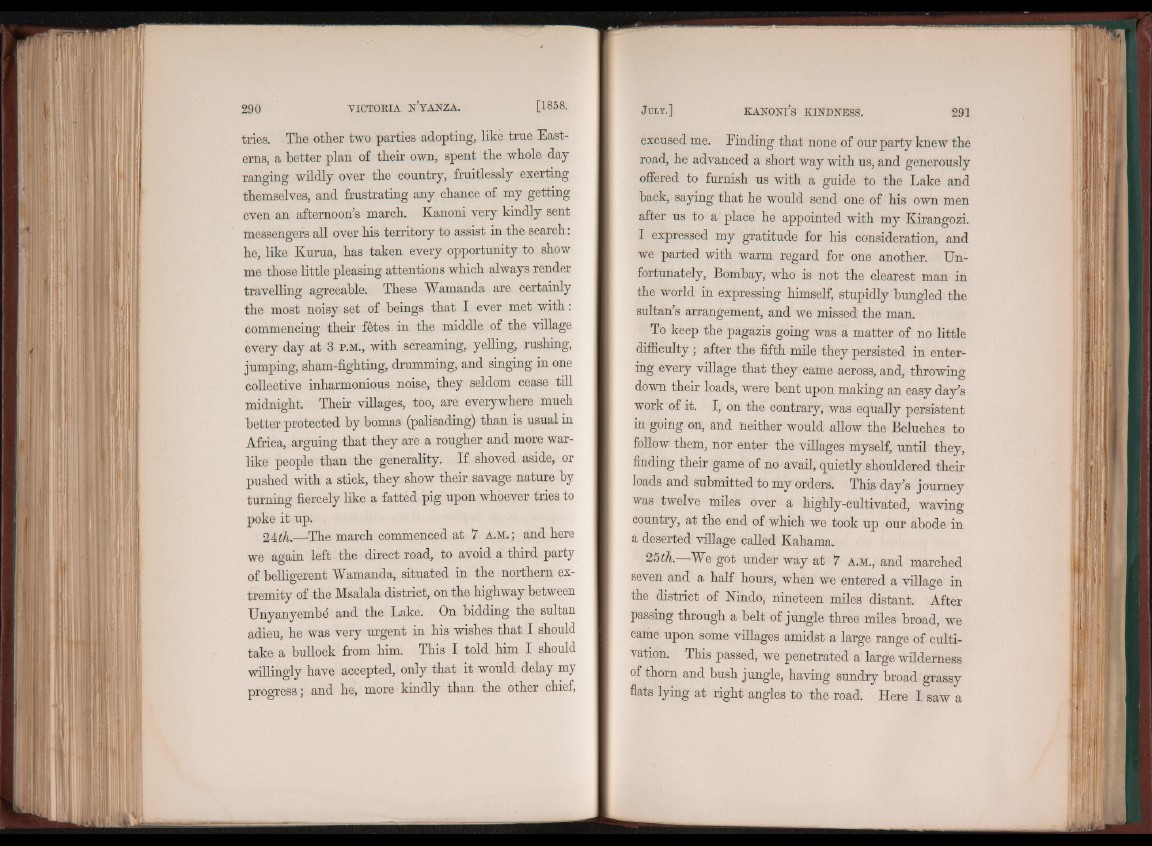
tries. The other two parties adopting, like true Easterns,
a better plan of their own, spent the whole day
ranging wildly over the country, fruitlessly exerting
themselves, and frustrating any chance of my getting
even an afternoon’s march. Kanoni very kindly sent
messengers all over his territory to assist in the search:
he, like Kurua, has taken every opportunity to show
me those little pleasing attentions which always render
travelling agreeable. These Wamanda are certainly
the most noisy set of beings that I ever met w ith :
commencing their fetes in the middle of the village
every day at 3 p .m., with screaming, yelling, rushing,
jumping, sham-fighting, drumming, and singing in one
collective inharmonious noise, they seldom cease till
midnight. Their villages, too, are everywhere much
better protected by bomas (palisading) than is usual in
Africa, arguing that they are a rougher and more warlike
people than the generality. If shoved aside, or
pushed with a stick, they show their savage nature by
turning fiercely like a fatted pig upon whoever tries to
poke it up.
2 4 th.—The march commenced at 7 A.M.; and here
we again left the direct road, to avoid a third party
of belligerent Wamanda, situated in the northern extremity
of the Msalala district, on the highway between
Unyanyembe and the Lake. On bidding the sultan
adieu, he was very urgent in his wishes that I should
take a bullock from him. This I told him I should
w illin g ly have accepted, only that it would delay my
progress , and he, more kindly than the other chief,
excused me. Finding that none of our party knew the
road, he advanced a short way with us, and generously
offered to furnish us with a guide to the Lake and
back, saying that he would send one of his own men
after us to a place he appointed with my Kirangozi.
I expressed my gratitude for his consideration, and
we parted with warm regard for one another. Unfortunately,
Bombay, who is not the clearest man in
the world in expressing himself, stupidly bungled the
sultan’s arrangement, and we missed the m a n ,
To keep the pagazis going was a matter of no little
difficulty; after the fifth mile they persisted in entering
every village that they came across, and, throwing
down their loads, were bent upon making an easy day’s
work of it. I, on the contrary, was equally persistent
in going on, and neither would allow the Beluches to
follow them, nor enter the villages myself, until they,
finding their game of no avail, quietly shouldered their
loads and submitted to my orders. This day’s journey
was twelve miles over a highly-cultivated, waving
country, at the end of which we took up our abode in
a deserted village called Eahama.
25 th. We got under way at 7 a .m., and marched
seven and a half hours, when we entered a village in
the district of Nindo, nineteen miles distant. After
passing through a belt of jungle three miles broad, we
came upon some villages amidst a large range of cultivation.
This passed, we penetrated a large wilderness
of thorn and bush jungle, having sundry broad grassy
flats lying at right angles to the road. Here I saw a